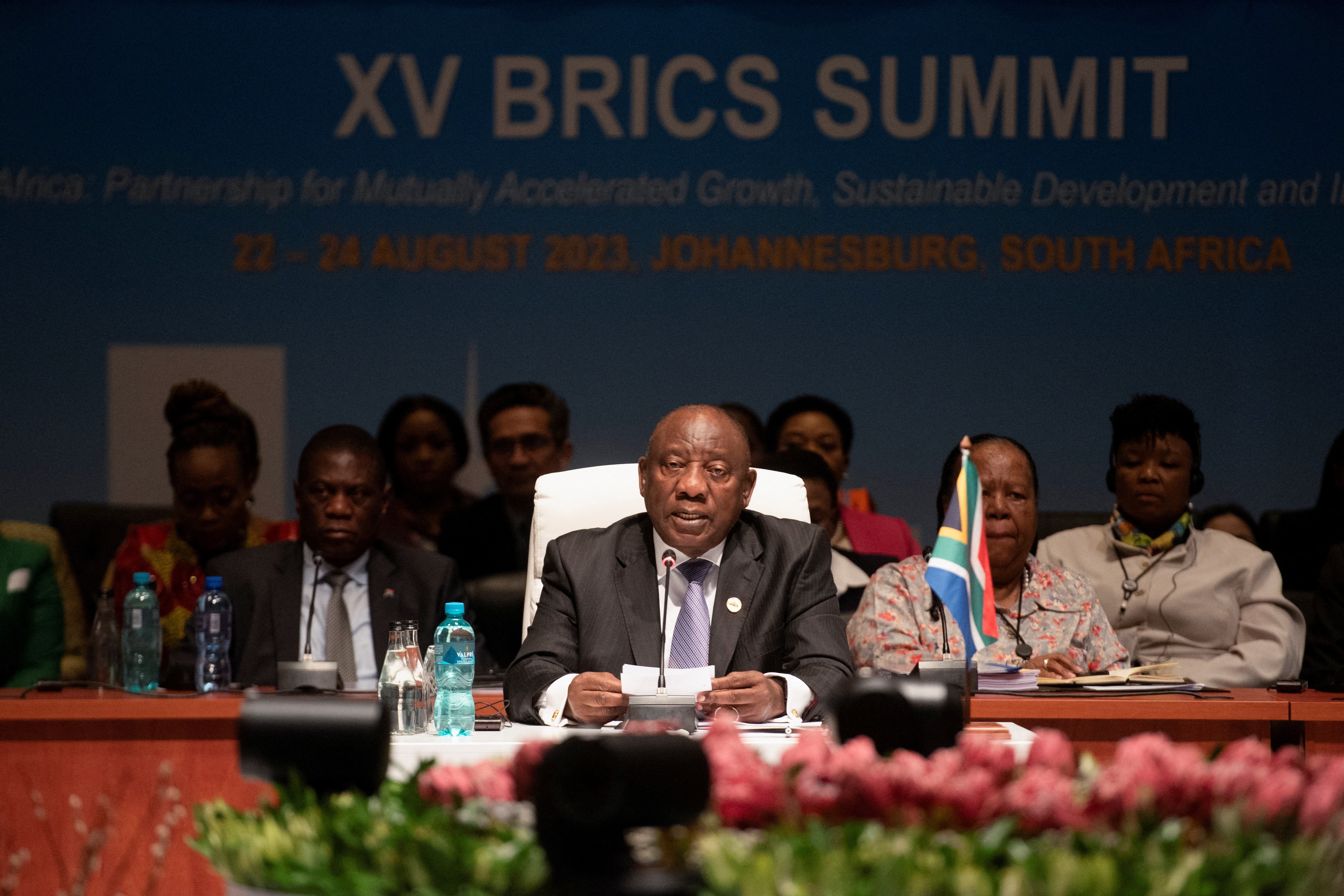On Thursday, South African President Cyril Ramaphosa announced that the BRICS grouping had decided to extend invitations to Saudi Arabia, Iran, Argentina, Egypt, Ethiopia, and the UAE to join the organisation.
The discussion on expanding the BRICS (Brazil, Russia, India, China, and South Africa) bloc determined the agenda during the three-day summit in Johannesburg.
BRICS Invites 6 Countries
Ramaphosa, the current chair of the BRICS group, stated that six nations have been asked to join the BRICS as part of the first phase of expansion. The new membership will come into effect on January 1, 2024.
BRICS NEWS: Argentina 🇦🇷, Egypt 🇪🇬, Iran 🇮🇷, UAE 🇦🇪, Saudi Arabia 🇸🇦 and Ethiopia 🇪🇹 will join the BRICS from 2024, said South African President Cyril Ramaposa. BRICS will not be limited to one expansion phase.
— DD Geopolitics (@DD_Geopolitics) August 24, 2023
Ramaposa also said that the BRICS leaders instructed the Ministries… pic.twitter.com/yyZtFnuicU
Ramaphosa said during a joint media briefing, “BRICS is a diverse group of nations,” adding that “as the five BRICS countries, we have reached an agreement on the guiding principles, standards, criteria, and procedures on the BRICS expansion process, which has been in discussion for quite a while.”
The South African president emphasised, “We have consensus on the first phase of this expansion process, and other phases will follow.”
According to reports, 23 nations have formally applied for BRICS membership, including the six invited by Ramaphosa. Other major African countries, including Nigeria and Ghana, have expressed informal interest.
Ramaphosa indicated possible future additions by saying, “We value the interest of other countries to form a partnership with BRICS. We have tasked our foreign ministers to further develop the BRICS country model and a list of prospective partner countries and report by the next summit.”
India fully supports BRICS expansion.
— BJP (@BJP4India) August 24, 2023
India believes that adding new members will make BRICS emerge as a more stronger organisation and will strengthen our collective actions.
- PM @narendramodi pic.twitter.com/dfahK5shAz
BRICS Leaders Hail Expansion
Indian PM Narendra Modi thanked Ramaphosa for the summit’s success and stated that India has always been fully supportive of BRICS expansion.
“India has always believed that the addition of new members will further strengthen BRICS as an organisation and it will give our shared efforts a new impetus,” Modi remarked.
Chinese President Xi Jinping claimed that the expansion marks a “new starting point for BRICs cooperation.” “It will bring new vigour to the BRICS cooperation mechanism, further strengthening a force for world peace and development,” he stated at a press conference.
Brazilian leader Luiz Inácio Lula da Silva said, “The relevance of the BRICS is demonstrated by the growing interest of other countries to join our group.” “Now the BRICS is going up to 37% of the world’s GDP in terms of its purchasing power, and 46% in terms of the world population. BRICS will continue [being] open to new members,” he added.
Meanwhile, Russian President Putin stated in a video message, “The adoption of the guiding principles in the expansion of BRICS will ensure that the role and importance of BRICS in the world will continue to grow.”
President Xi Jinping hailed the "historic" expansion of the #BRICS, a group of leading emerging economies, to include six new members on Thursday, saying that the move marks a new starting point for BRICS cooperation and will inject new momentum for the mechanism. #XiJinping… pic.twitter.com/8M8sIYRvDX
— China Daily (@ChinaDaily) August 24, 2023
BRICS Expansion to Counter G7 Dominance
According to a report by Bloomberg, major emerging market countries are prepared to invite major oil producer Saudi Arabia and possibly other countries to join their bloc to strengthen their global influence.
Members have indicated that expansion of the bloc can assist in fighting the G7’s influence in global affairs, the report noted.
According to sources, the call for expansion was primarily led by China, while Russia and South Africa also supported it. India worried that the expansion of BRICS would “become a mouthpiece for China,” while Brazil was concerned about alienating the West.
An expanded BRICS, including Saudi Arabia and Indonesia, would account for 44% of the global economy by 2040, surpassing the G7’s estimated contribution of 21%, based on estimates by Bloomberg Economics.

